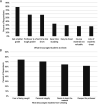Maximizing Academic Integrity While Minimizing Stress in the Virtual Classroom
- PMID: 35496711
- PMCID: PMC9053040
- DOI: 10.1128/jmbe.00292-21
Maximizing Academic Integrity While Minimizing Stress in the Virtual Classroom
Abstract
The article documents students' experiences with the shift online at the onset of the COVID-19 pandemic and provides informed recommendations to STEM instructors regarding academic integrity and student stress. Over 500 students were surveyed on these topics, including an open-ended question. Students experienced more stress and perceived a greater workload in online courses and therefore preferred in-person courses overall. Personal awareness of cheating during online exams is positively correlated with the proportion of cheating a student perceives. Fear of getting caught is the best cheating deterrent while getting a better grade makes cheating most enticing. Randomization of questions and answer choices is perceived as a highly effective tool to reduce cheating and is reported as the least stress-inducing method. Inability to backtrack and time limits cause students the most stress. Students report that multiple choice questions are the least effective question type to discourage cheating and oral exam questions cause the most stress. Use of camera and lockdown browser or being video- and audio- recorded caused the majority of student stress. Yet, nearly 60% agree that the combination of camera and lockdown browser is an effective deterrent. Recommendations: (i) Be transparent regarding academic dishonesty detection methods and penalties. (ii) Use online invigilating tools. (iii) Synchronize exams and (iv) randomize exam questions. (v) Allow backtracking. (vi) Avoid converting in-person exams to online exams; instead, explore new ways of designing exams for the online environment.
Keywords: academic integrity; cheating; exams; online exams; stress; virtual classroom.
Copyright © 2022 Novick et al.
Conflict of interest statement
The authors declare no conflict of interest.
Figures








Similar articles
-
Reconnecting Students and Faculty to Maximize Academic Integrity and Minimize Student Stress in the Virtual Classroom.J Microbiol Biol Educ. 2022 Sep 12;23(3):e00080-22. doi: 10.1128/jmbe.00080-22. eCollection 2022 Dec. J Microbiol Biol Educ. 2022. PMID: 36532216 Free PMC article.
-
Dental Student Academic Integrity in U.S. Dental Schools: Current Status and Recommendations for Enhancement.J Dent Educ. 2016 Jan;80(1):5-13. J Dent Educ. 2016. PMID: 26729679
-
Remote E-exams during Covid-19 pandemic: A cross-sectional study of students' preferences and academic dishonesty in faculties of medical sciences.Ann Med Surg (Lond). 2021 Feb;62:326-333. doi: 10.1016/j.amsu.2021.01.054. Epub 2021 Jan 23. Ann Med Surg (Lond). 2021. PMID: 33520225 Free PMC article.
-
A Method for Cheating Indication in Unproctored On-Line Exams.Sensors (Basel). 2022 Jan 15;22(2):654. doi: 10.3390/s22020654. Sensors (Basel). 2022. PMID: 35062615 Free PMC article.
-
Online Laboratory Experiment Learning Module for Biomedical Engineering Physiological Laboratory Courses.Biomed Eng Educ. 2021;1(1):201-208. doi: 10.1007/s43683-020-00034-9. Epub 2020 Oct 16. Biomed Eng Educ. 2021. PMID: 35178535 Free PMC article. Review.
Cited by
-
Reconnecting Students and Faculty to Maximize Academic Integrity and Minimize Student Stress in the Virtual Classroom.J Microbiol Biol Educ. 2022 Sep 12;23(3):e00080-22. doi: 10.1128/jmbe.00080-22. eCollection 2022 Dec. J Microbiol Biol Educ. 2022. PMID: 36532216 Free PMC article.
-
Opportunities and Challenges of Online Instruction and Effective Pedagogy That Blurs the Lines between Online and On-Site Teaching and Learning.J Microbiol Biol Educ. 2022 Apr 11;23(1):e00047-22. doi: 10.1128/jmbe.00047-22. eCollection 2022 Apr. J Microbiol Biol Educ. 2022. PMID: 35496714 Free PMC article. No abstract available.
-
Factors associated with the perception of university professors about academic dishonesty in dental students from two peruvian universities: analysis under multivariable regression model.BMC Med Educ. 2023 May 2;23(1):297. doi: 10.1186/s12909-023-04281-6. BMC Med Educ. 2023. PMID: 37131160 Free PMC article.
References
-
- Mervosh S, Swales V. 2020. Colleges and universities cancel classes and move online amid coronavirus fears. The New York Times.
-
- McCabe D. 2015. Cheating and honor: lessons from a long-term research project. In: Bretag T. (ed) Handbook of Academic Integrity. Springer, Singapore.
-
- Passow HJ, Mayhew MJ, Finelli CJ, Harding TS, Carpenter DD. 2006. Factors influencing engineering students’ decisions to cheat by type of assessment. Res High Educ 47:643–684. doi:10.1007/s11162-006-9010-y. - DOI
-
- Hobbs T. 2021. Cheating at school is easier than ever - and it is rampant. The Wall Street J. https://www.wsj.com/articles/cheating-at-school-is-easier-than-everand-i....
LinkOut - more resources
Full Text Sources
